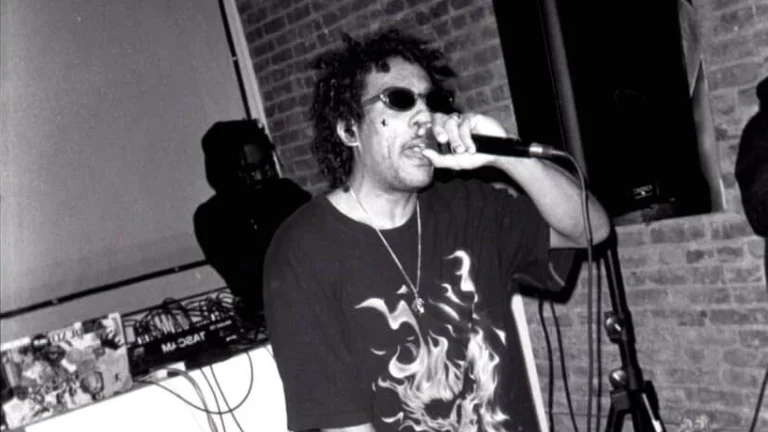“Everyday that goes by is a tribute.” – “No New Deaths Today”
The music video for “Dumpster Gold” opens with Murray, lead singer, songwriter and composer of Montreal indie rock band The Dears, sitting on his bed listening to a cassette tape featuring a sermon given by his father, William Lightburn. The paternal figure talks about trying to let go of the past, but the album produced by his son, Once Upon a Time in Montreal, proves to be a foil to the topic. In order to make this album, doubling as a eulogy of his father who died of Alzheimer’s disease, Murray had to have conversations with his mom about his father’s past. With it, Murray crafted a biopic about his father, who used to be a jazz musician before he transitioned to be a family man and preacher. The way Murray pulls it off is not only stunning, but also masterfully compact. (The album is only a half hour long.)
In order to tackle this, Murray has to assume different characters and genres, as he has done on multiple previous solo albums. Mass to Light dug into electronic music with an accompanying comic on a website, Hear Me Out is Murray tackling vintage soul music, and Montreal, Lightburn’s latest release, flips between big band jazz, soul, and folk, and while the music is not different from Hear Me Out, it approaches music differently from a point of grandeur. Beginning with the mourning song “Dumpster Gold,” Murray reaches for “ stories of all the stuff that broke” his father. Once he finds out that information, he begins the story with stories of his father Christian-centric upbringing (“In The Kingdom of Heaven”) before continuing his story from an immigrant towards Montreal to a man in love with “The Only Voice I Want to Hear.”
With spare romantic guitar, Murray assumes the role of his father wooing his lover of a life that may not always be the happiest, but would be filled with love. The love would also extend to his father’s love for God, as “Oh But My Heart Has Never Been Dark” chronicles a hard time getting used to Montreal. “Took no time at all to understand/I’m just a stranger in a stranger land,” sings Murray as his father before signaling that Christianity turned everything around.
If the story says anything, it is that the quest for love never got any easier. But the more French, pop-flavored title track finds his father not only more “hopeful,” but more willing when in love. To waltzing drums, Murray sings, “I’ll learn some French, avec plaisir/I’ll sacrifice what little I’ve/my saxophone and all that jive,” which his father did as a former jazz musician. The song as-is perfectly fits Murray’s attempt to be a big band singer, and it would have made a fitting ending to the story.
Before that happens, “Girl You’ve Got to Let Me Go,” a song Murray wrote as his father’s spiritual conduit to his mother, caps the ode with heartstring-pulling piano and spare guitars in the background. What begins as a soft goodbye wraps Murray’s recollection of his father’s illness into something that begins with sadness, but ends with the intent of happiness. Happy that he is free of a life that was filled with strife, knowing it was also filled with love for his wife, his family and the Lord. It’s a tearjerker of an ending, be it a happy or sad one, and one that closes the album in a way where the message, as most funerals and eulogies do, calls less for mourning and more for celebration.
I asked Lightburn if this was meant to be a concept album, and he responded there was no “concept” because all of the songs were based on a true story. If I may argue, Murray choosing to be a musical conduit for both his father and his story is a heartwarming concept in itself, even if to get the story, he had to go to the person that changed his father’s life trajectory. With eight songs and a half hour, Lightburn eulogizes his father, tells his story and knocks out a beautifully orchestrated album in the process.





